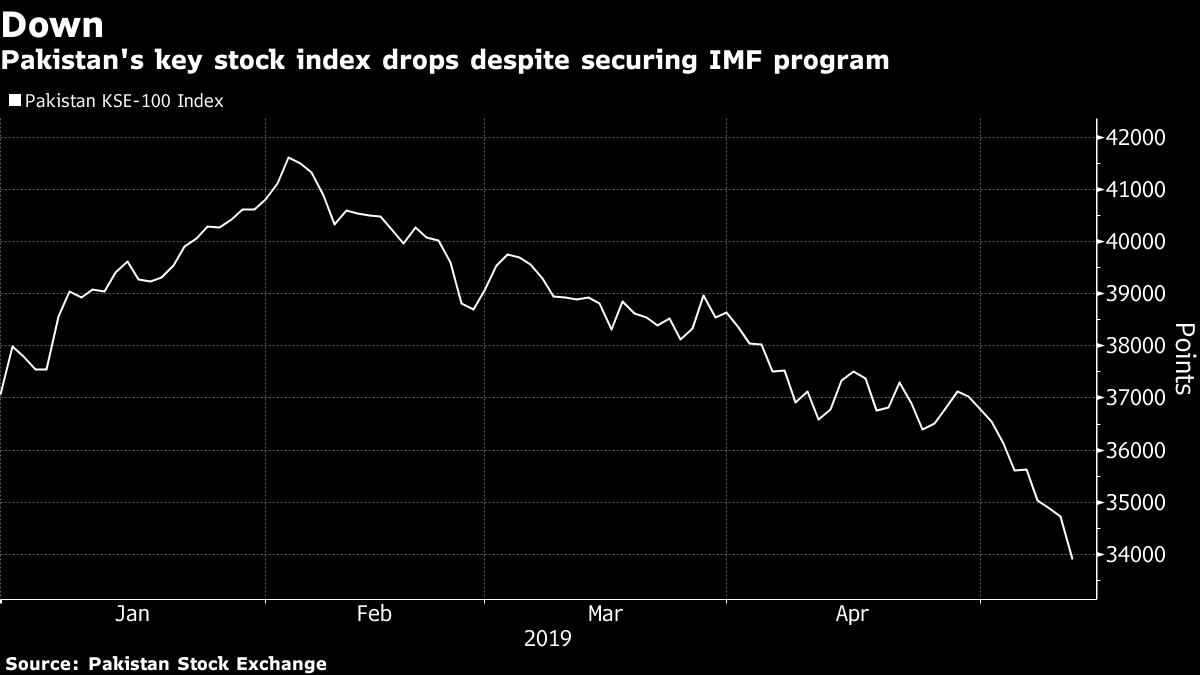KAMRAN HAIDER and ISMAIL DILAWAR
National security imperatives of the waters are rising as surely as the sea levels around the world because of climate change.
Pakistan’s stock market fell the most this year amid concern about the steps needed to seal a $6 billion loan agreed on with the International Monetary Fund.
The lender’s executive board will meet to approve the agreement for the 39 month loan, “subject to the timely implementation of prior actions and confirmation of international partners’ financial commitments,” IMF’s mission chief Ernesto Ramirez Rigo said in a statement.
A lack of clarity around these actions prompted speculation about further currency devaluations and interest rates increases, which rattled markets, according to NBP Fullerton Asset Management Ltd. and FIM Partners.
The loan would represent the 13th bailout since the late 1980s from the IMF to Pakistan, which is facing a balance-of-payments crisis triggered by high fiscal and current-account deficits and dwindling foreign exchange reserves. The pact was reached after Prime Minister Imran Khan overhauled his economic team, including the installation as central bank governor of Reza Baqir, who previously served in senior positions at the IMF, including in Egypt.
“The IMF statement is understandably vague at this stage and that is leading to more speculation,” said Mohammed Ali Hussain, Dubai-based head of research at FIM Partners, which handles $2.1 billion in assets. “Granular details about the program as well as the timing of conditions will play a role in market sentiment.”
An Egypt-style program, where most changes are required at the start, would be bad for sentiment though a gradual one “may play a bit better,” he added.
The nation’s benchmark KSE-100 Index of stocks fell 2.35% at close, the most in more than five months, erasing earlier gains of 1.5%. The rupee was little changed.

More Needed
IMF’s Rigo noted efforts to stabilize the nation’s economy but said more needs to be done.
“Decisive policies and reforms, together with significant external financing are necessary to reduce vulnerabilities faster, increase confidence, and put the economy back on a sustainable growth path,” he said.
Abdul Hafeez Shaikh, an economic adviser to the prime minister, told state-run Pakistan Television that there had been some overspending by the government, so to “recover costs we will have to increase prices in certain areas of the economy.” The IMF facility “should be taken as a program of structural changes” and its success depends upon how successfully the country implements it, he said.
Pakistan agreed on a bailout after almost a six-month delay that prompted rating companies to downgrade the nation’s credit score earlier this year. The central bank has already devalued the currency by about 20% in the past year, making it the worst performer in Asia, according to a basket of 13 currencies compiled by Bloomberg.
“Any currency adjustment should be made as soon as possible,” said Amjad Waheed, chief executive officer at NBP Fullerton Asset Management Ltd., the nation’s largest mutual fund. “This will give confidence to foreign investors to enter the market. It will also encourage local investors to move towards equities.”
Prime Minister Khan has faced criticism from economists and opposition parties for delaying the loan and mishandling the economy. Khan had said the program was delayed as he set about securing more than $7 billion of loans from Saudi Arabia, the United Arab Emirates and China. While the IMF loan also doesn’t solve the financing gap, it opens up the possibility of Pakistan accessing debt markets, according to Hasnain Malik, head of equity strategy at Dubai-based Tellimer.
“This bailout package should be a positive in the medium to long run, provided the reform agenda is religiously pursued,” said Khurram Schehzad, chief executive officer of financial advisory firm Alpha Beta Core.
Pakistan’s opposition parties have asked for a parliamentary briefing on the details of the IMF loan agreement.
“We don’t accept it like this,’’ said Senator Sherry Rehman of Pakistan People’s Party, the nation’s second-biggest opposition party. “It seems that the agreement will bring a tsunami of price hikes.”

No comments:
Post a Comment